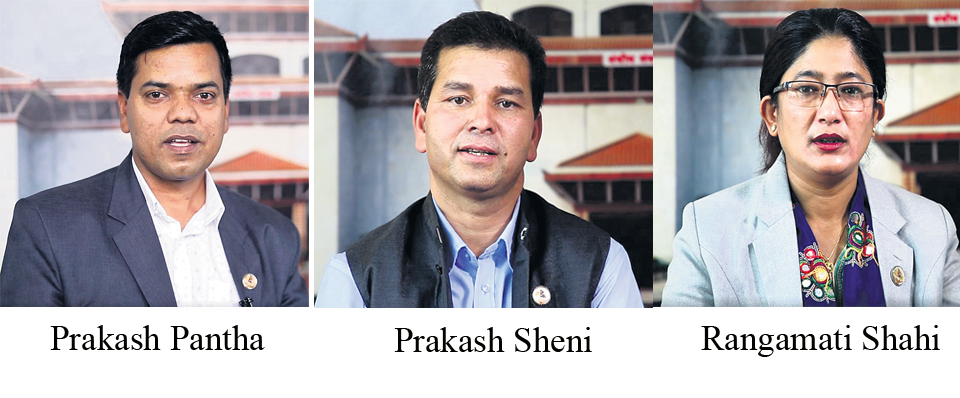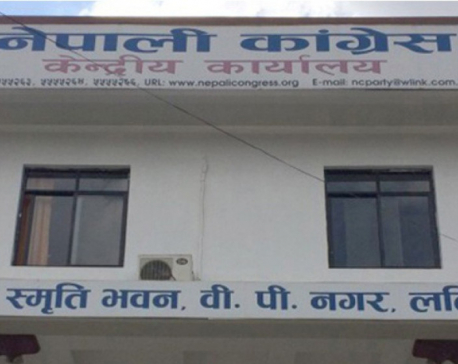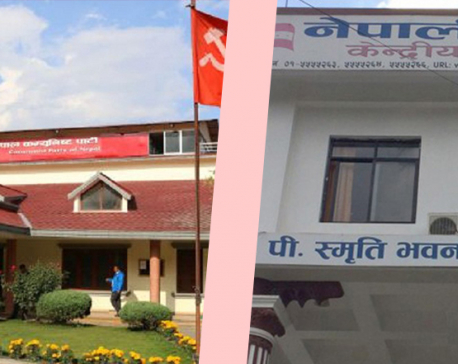
OR
NC lawmakers move SC against discrimination in pork barrel fund
Published On: December 17, 2019 08:30 AM NPT By: Republica | @RepublicaNepal

KATHMANDU, Dec 17: A group of lawmakers on Monday filed a writ petition at the Supreme Court, demanding the apex court scrap the regulations governing the Constituency Infrastructure Development Program (CIDP) as these discriminate between lawmakers elected under First Past the Post and and those elected under Proportional Representation .
The lawmakers, who represent the main opposition Nepali Congress (NC), filed the writ petition arguing that it was not justifiable to discriminate between lawmakers elected under FPTP and those chosen under PR, when it comes to providing them funds under the CIDP.
Lawmakers Prakash Rashailee Snehi, Rangamati Shahi and Prakash Pantha have demanded that the apex court order an immediately halt to the fund distribution under such discriminatory provisions.
The petitioners have argued that although the Constitution of Nepal has given equal status to FPTP, PR and National Assembly lawmakers the CIDP (Working Procedures) Regulations introduced recently by the government had decided to provide the funds only to lawmaker elected under FPTP . They have maintained that this is fundamentally discriminatory and thus requires to be scrapped.
There are a total of 165 FPTP and 110 PR lawmakers in the House of Representatives. The National House has a total of 59 members.
The government has been providing Rs 60 million to each of the 165 lawmakers elected under FPTP in the lower house. The 110 PR lawmakers in the lower house and 59 lawmakers of the upper house are denied the funds.
The government has been distributing the amounts to lawmakers under CIDP after the apex court issued an interim order against fund distribution under an earlier Lawmakers Constituency Development Fund. The ruling was issued in response to a writ petition filed by lawmaker Jhapat Rawal.
The writ petitioners on Monday have named the Office of the Prime Minister and Council of Ministers, the Ministry of Finance and the secretariat of the House of Representatives as defendants.
The newly-introduced regulations governing CIDP state that the authority to select, monitor and evaluate programs to be executed under the Rs 60 million CIDP fund shall reside with the FPTP lawmaker and in case of any dispute the final authority will lie with the lawmaker.
The petitioners have argued that such a discriminatory provision goes against Articles 18, 83, 84 and 86 and Clause 213 of the budget speech of Finance Minister Yubaraj Khatiwada. The apex court has scheduled initial hearings for Wednesday.
Although the new regulations governing the fund distribution include a provision for channeling the funds through local government mechanisms, there are concerns over gross misuse as MPs tend to choose development projects selected by their own cadres instead of those identified by the general public on the basis of local needs.
Despite criticism from various quarters, the government had earlier decided to provide Rs 60 million to each lawmaker in the HoR elected under the FPTP electoral system.
Finance Minister Khatiwada had announced an increase in the amount by 50 percent from the existing Rs 40 million for each of the 165 lawmakers, in the name of the Constituency Development Fund.
Although the finance minister was said to be personally against a budget allocation under this head amidst concerns that it was little more than a pork barrel arrangement, he took the decision allegedly under pressure from both the ruling and opposition parties. A total of Rs 9.9 billion has been allocated in the budget this fiscal year for the purpose.
Lawmakers from the NCP had earlier lobbied hard to increase the Rs 40 million allocated to each of the 165 directly elected lawmakers of the lower house by at least 50 percent. A section of lawmakers from both the ruling and main opposition parties had then criticized the government for missing an opportunity to simply scrap the pork barrel that has courted serious controversy for years.
You May Like This

NC calls Central Working Committee meeting
KATHMANDU, Dec 27: Nepali Congress has called a meeting of the party’s Central Working Committee (CWC) on Friday. ... Read More...

Ruling, main opposition lawmakers not to receive Dashain allowances
KATHMANDU, Oct 19: Parliamentarians belonging to the ruling Nepal Communist Party (NCP) and the main opposition Nepali Congress (NC) have... Read More...










Just In
- NRB introduces cautiously flexible measures to address ongoing slowdown in various economic sectors
- Forced Covid-19 cremations: is it too late for redemption?
- NRB to provide collateral-free loans to foreign employment seekers
- NEB to publish Grade 12 results next week
- Body handover begins; Relatives remain dissatisfied with insurance, compensation amount
- NC defers its plan to join Koshi govt
- NRB to review microfinance loan interest rate
- 134 dead in floods and landslides since onset of monsoon this year








Leave A Comment